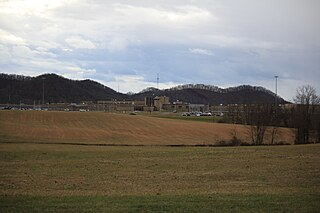
Kentucky, officially the Commonwealth of Kentucky, is a state in the Southeastern region of the United States and one of the states of the Upper South. It borders Illinois, Indiana, and Ohio to the north, West Virginia to the northeast, Virginia to the east, Tennessee to the south, and Missouri to the west. Its northern border is defined by the Ohio River. Its capital is Frankfort, and its largest city is Louisville. Its population was approximately 4.5 million in 2020.

Louisville is the largest city in the Commonwealth of Kentucky, sixth-most populous city in the Southeast, and the 28th most-populous city in the United States. Louisville is the historical seat and, since 2003, the nominal seat of Jefferson County, on the Indiana border.

In the United States, capital punishment is a legal penalty throughout the country at the federal level, in 27 states, and in American Samoa. It is also a legal penalty for some military offenses. Capital punishment has been abolished in 23 states and in the federal capital, Washington, D.C. Capital punishment is, in practice, only applied for aggravated murder. Although it is a legal penalty in 27 states, only 20 states have the ability to execute death sentences, with the other seven, as well as the federal government, being subject to different types of moratoriums. The existence of capital punishment in the United States can be traced to early colonial Virginia. Along with Japan, South Korea, Taiwan, and Singapore, the United States is one of five advanced democracies and the only Western nation that applies the death penalty regularly. It is one of 54 countries worldwide applying it, and was the first to develop lethal injection as a method of execution, which has since been adopted by five other countries. The Philippines has since abolished executions, and Guatemala has done so for civil offenses, leaving the United States as one of four countries to still use this method. It is common practice for the condemned to be administered sedatives prior to execution, regardless of the method used.
Capital punishment is a legal penalty in the U.S. state of Arkansas.

Capital punishment is a legal penalty in the U.S. state of Ohio, although all executions have been suspended indefinitely by Governor Mike DeWine until a replacement for lethal injection is chosen by the Ohio General Assembly. The last execution in the state was in July 2018, when Robert J. Van Hook was executed via lethal injection for murder.
A condemned prisoner's last meal is a customary ritual preceding execution. In many countries, the prisoner may, within reason, select what the last meal will be.
Florida State Prison (FSP), otherwise known as Raiford Prison, is a correctional institution located in unincorporated Bradford County, Florida. It was formerly known as the "Florida State Prison-East Unit" as it was originally part of Florida State Prison in Raiford, Florida. The facility, a part of the Florida Department of Corrections, is located on State Road 16 right across the border from Union County. The institution opened in 1961, even though construction was not completed until 1968. With a maximum population of over 1,400 inmates, FSP is one of the largest prisons in the state. FSP houses one of the state's three death row cell blocks, and the state's execution chamber. Union Correctional Institution also houses male death row inmates while Lowell Annex houses female death row inmates.

The Kentucky Department of Corrections is a state agency of the Kentucky Justice & Public Safety Cabinet that operates state-owned adult correctional facilities and provides oversight for and sets standards for county jails. They also provide training, community based services, and oversees the state's Probation & Parole Division. The agency is headquartered in the Health Services Building in Frankfort.
An execution chamber, or death chamber, is a room or chamber in which capital punishment is carried out. Execution chambers are almost always inside the walls of a maximum-security prison, although not always at the same prison where the death row population is housed. Inside the chamber is the device used to carry out the death sentence.
Stephen Roberts Nunn is an American convicted murderer and former politician who served as the Deputy Secretary of Health and Family Services for the Commonwealth of Kentucky.

The use of capital punishment by the United States military is a legal penalty in martial criminal justice. Despite its legality, capital punishment has not been imposed by the U.S. military in over sixty years.

William C. Holman Correctional Facility is an Alabama Department of Corrections prison located in Atmore, Alabama. The facility is along Alabama State Highway 21, 9 miles (14 km) north of Atmore in southern Alabama.

The Kentucky State Penitentiary (KSP), also known as the "Castle on the Cumberland," is a maximum security and supermax prison with capacity for 856 prisoners located in Eddyville, Kentucky on Lake Barkley on the Cumberland River, about 4.8 kilometres (3 mi) from downtown Eddyville. It is managed by the Kentucky Department of Corrections. Completed in 1886, it is Kentucky's oldest prison facility and the only commonwealth-owned facility with supermax units. The penitentiary houses Kentucky's male death row inmates and the commonwealth's execution facility. As of 2015 it had approximately 350 staff members and an annual operating budget of $20 million. In most cases, inmates are not sent directly to the penitentiary after sentencing, but are sent there because of violent or disruptive behavior committed in other less secure correctional facilities in the commonwealth. This was Kentucky's second penitentiary. The first Kentucky State Penitentiary in Frankfort was made uninhabitable from the 1937 flood.
Kentucky Correctional Institution for Women (KCIW) is a prison located in unincorporated Shelby County, Kentucky, near Pewee Valley, Kentucky, operated by the Kentucky Department of Corrections. Male and female inmates prior to 1937 had been housed at the Kentucky State Penitentiary in Frankfort

Kentucky State Reformatory (KSR) is a medium-security prison for adult males. The prison is located in unincorporated Oldham County, Kentucky, near La Grange, and about 30 miles (48 km) northeast of Louisville. It opened in 1940 to replace the Kentucky State Penitentiary in Frankfort after a flood damaged the original property. The current (2020) capacity of KSR is 1053 inmates.
Death row, also known as condemned row, is a place in a prison that houses inmates awaiting execution after being convicted of a capital crime and sentenced to death. The term is also used figuratively to describe the state of awaiting execution, even in places where no special facility or separate unit for condemned inmates exists. In the United States, after an individual is found guilty of a capital offense in states where execution is a legal penalty, the judge will give the jury the option of imposing a death sentence or life imprisonment without the possibility of parole. It is then up to the jury to decide whether to give the death sentence; this usually has to be a unanimous decision. If the jury agrees on death, the defendant will remain on death row during appeal and habeas corpus procedures, which may continue for several decades.

Boyce Ficklen Martin Jr. was a United States circuit judge of the United States Court of Appeals for the Sixth Circuit. Appointed by President Jimmy Carter in 1979, Martin served as chief judge of the circuit from 1996 to 2003 and wrote more than 1,100 opinions during his 34-year tenure. Martin lived in Louisville, Kentucky.

The Tucker Unit is a prison in Dudley Lake Township, unincorporated Jefferson County, Arkansas, 25 miles (40 km) northeast of Pine Bluff. It is operated by the Arkansas Department of Correction (ADC). Tucker is one of the state of Arkansas's "parent units" for male prisoners; it serves as one of several units of initial assignment for processed male prisoners. It is in proximity to, but not within, the Tucker census-designated place.
Capital punishment is a legal penalty in the U.S. state of Kentucky.










